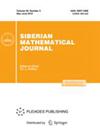与 S4.2 有关的模态逻辑中的可接受性和统一性
IF 0.7
4区 数学
Q2 MATHEMATICS
引用次数: 0
摘要
摘要 我们研究无限类模态逻辑的统一性和可接受性。附加在这些逻辑上的条件是可判定的、克里普克完备的,并且是由拥有最大状态簇的有根框架类产生的(特别是,这些逻辑扩展了模态逻辑S4.2)。给定这样的逻辑\( L\) 和每个公式\( \alpha\) 在\( L\) 中都是可统一的,我们为\( \alpha\) 在\( L\) 中构造一个统一符\( \sigma\)、其中 \( \sigma\) 验证了任意推理规则 \( \alpha/\beta \)在 \( L\) 中的可接受性,这些推理规则具有交换模式结论 \( \beta \)(即.e., \解决了这类规则的可接受性问题)。本文章由计算机程序翻译,如有差异,请以英文原文为准。
Admissibility and Unification in the Modal Logics Related to S4.2
Abstract
We study unification and admissibility for an infinite class of modal logics. Conditions superimposed to these logics are to be decidable, Kripke complete, and generated by the classes of rooted frames possessing the greatest clusters of states (in particular, these logics extend modal logic S4.2). Given such logic \( L \) and each formula \( \alpha \) unifiable in \( L \) , we construct a unifier \( \sigma \) for \( \alpha \) in \( L \) , where \( \sigma \) verifies admissibility in \( L \) of arbitrary inference rules \( \alpha/\beta \) with a switched-modality conclusions \( \beta \) (i.e., \( \sigma \) solves the admissibility problem for such rules).
求助全文
通过发布文献求助,成功后即可免费获取论文全文。
去求助
来源期刊
CiteScore
1.00
自引率
20.00%
发文量
88
审稿时长
4-8 weeks
期刊介绍:
Siberian Mathematical Journal is journal published in collaboration with the Sobolev Institute of Mathematics in Novosibirsk. The journal publishes the results of studies in various branches of mathematics.

 求助内容:
求助内容: 应助结果提醒方式:
应助结果提醒方式:


